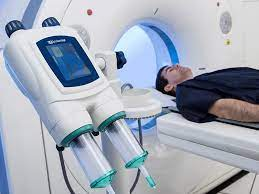What Are Contrast Agents and How Do They Help?
Did your doctor order an imaging test that requires contrast? If so, you might wonder what contrast is and how it will affect your test.
Contrast agents are substances used to enhance the visibility of tissues or organs during medical imaging procedures. These substances are injected into the body to help improve the quality of images produced by medical imaging tests. By increasing the contrast between different tissues, contrast agents can help doctors better visualize and diagnose conditions such as cancer, heart disease, and other disorders.

Commonly used contrast agents include iodine-based agents (such as iohexol and iopamidol) and gadolinium-based agents (such as gadodiamide and gadoversetamide).
Contrast agents work by absorbing or reflecting x-rays, which makes them appear brighter on an imaging test than the surrounding tissues. They’re used in a variety of imaging tests, including computed tomography (CT), magnetic resonance imaging (MRI), angiography, and nuclear medicine scans.
Two Main Types of Contrast Agents
There are two main types of contrast agents: intravascular and oral.
Intravascular contrast agents are injected into the bloodstream and work by opacifying (or making opaque) the blood vessels. This allows doctors to see blood flow more clearly and can be used to diagnose problems with blood vessels such as blockages or leaks.
Oral contrast agents are substances that are ingested orally and can help doctors see internal structures better during medical imaging procedures. Contrast agents work by absorbing or reflecting X-rays, which makes them appear darker than the surrounding tissues on an X-ray image.
There are different types of oral contrast agents, and each type is designed to help visualize specific structures. For example, barium sulfate is often used to improve the visibility of the gastrointestinal tract during an X-ray procedure called a barium swallow study. Other types of oral contrast agents include iodine-based agents, which are used to improve the visibility of the urinary tract, and gadolinium-based agents, which are used to improve the visibility of blood vessels.
Are There Any Side Effects of Contrast Agents?
Contrast agents are generally safe and well-tolerated, but like all medical procedures, there are some risks associated with their use. The most common side effect is a temporary increase in blood pressure. Other mild side effects can include nausea, vomiting, and headaches.
More serious side effects, such as allergic reactions or kidney damage, are rare but can occur. If you have certain medical conditions, such as diabetes or kidney disease, you might be at an increased risk of developing a serious side effect. Be sure to talk to your doctor about any potential risks before having a procedure that uses contrast agents.
How ImageCare Radiology Can Help
At ImageCare Radiology, we offer a wide variety of contrast exams, such as CT scans and MRIs. We can give contrast agents in one of two ways, depending on the exam: orally or intravenously. We often use iodine-based contrast for most of our CT scans. As such, it can leave a metallic taste in your mouth.
Our caring technicians can help you through any procedure involving contrast, and we are here to answer your questions.
Schedule Your Radiology Screening Today
If your doctor orders a test that requires a contrast agent, we can help. Our imaging centers offer a variety of diagnostic imaging services to help diagnose and treat cancers, gastrointestinal diseases, neurological conditions, and more. Please let us know what tests you need, and we can help you! Give us a call today at 973-871-3333 to schedule an appointment, or complete our convenient online appointment request form.